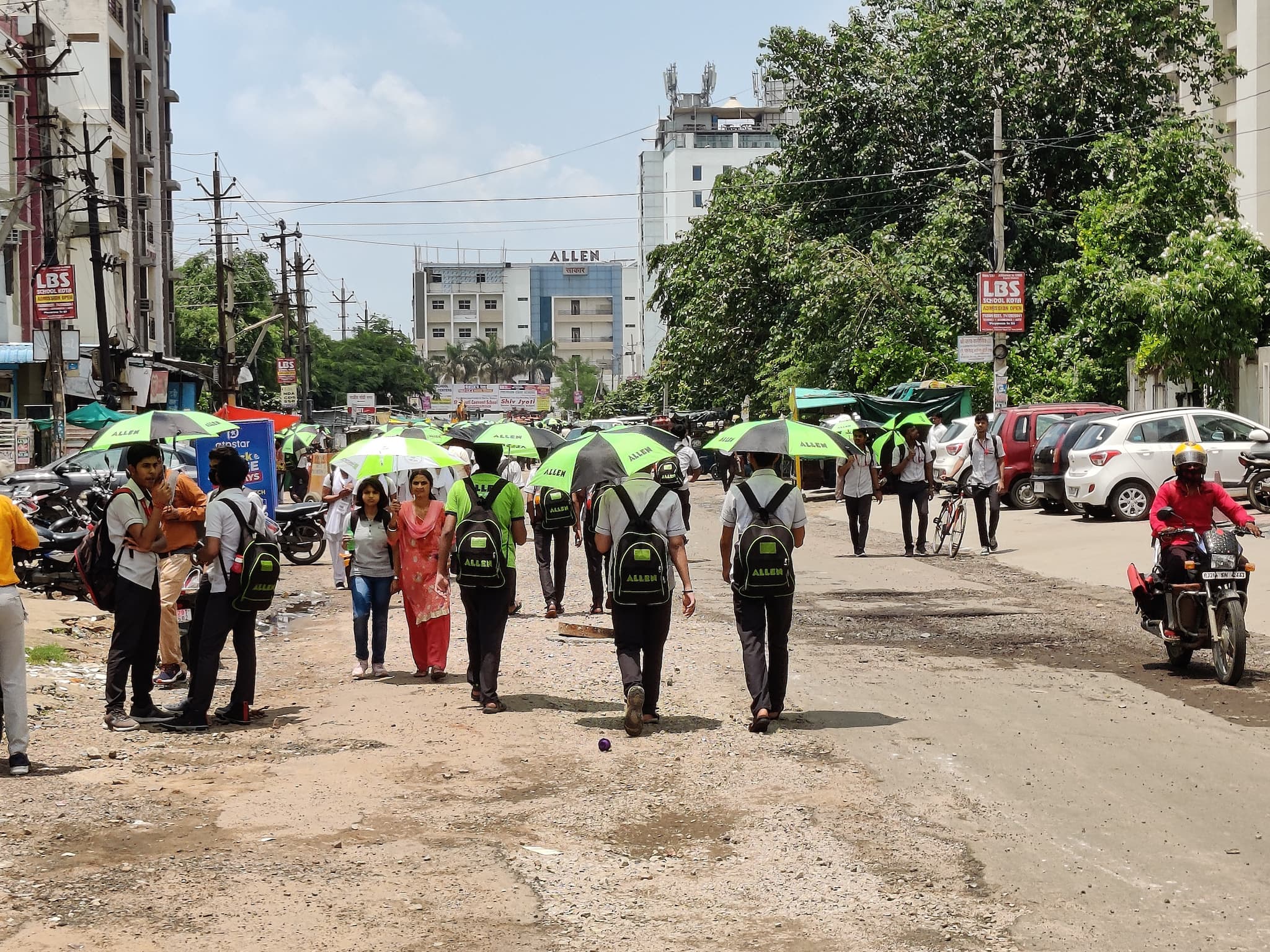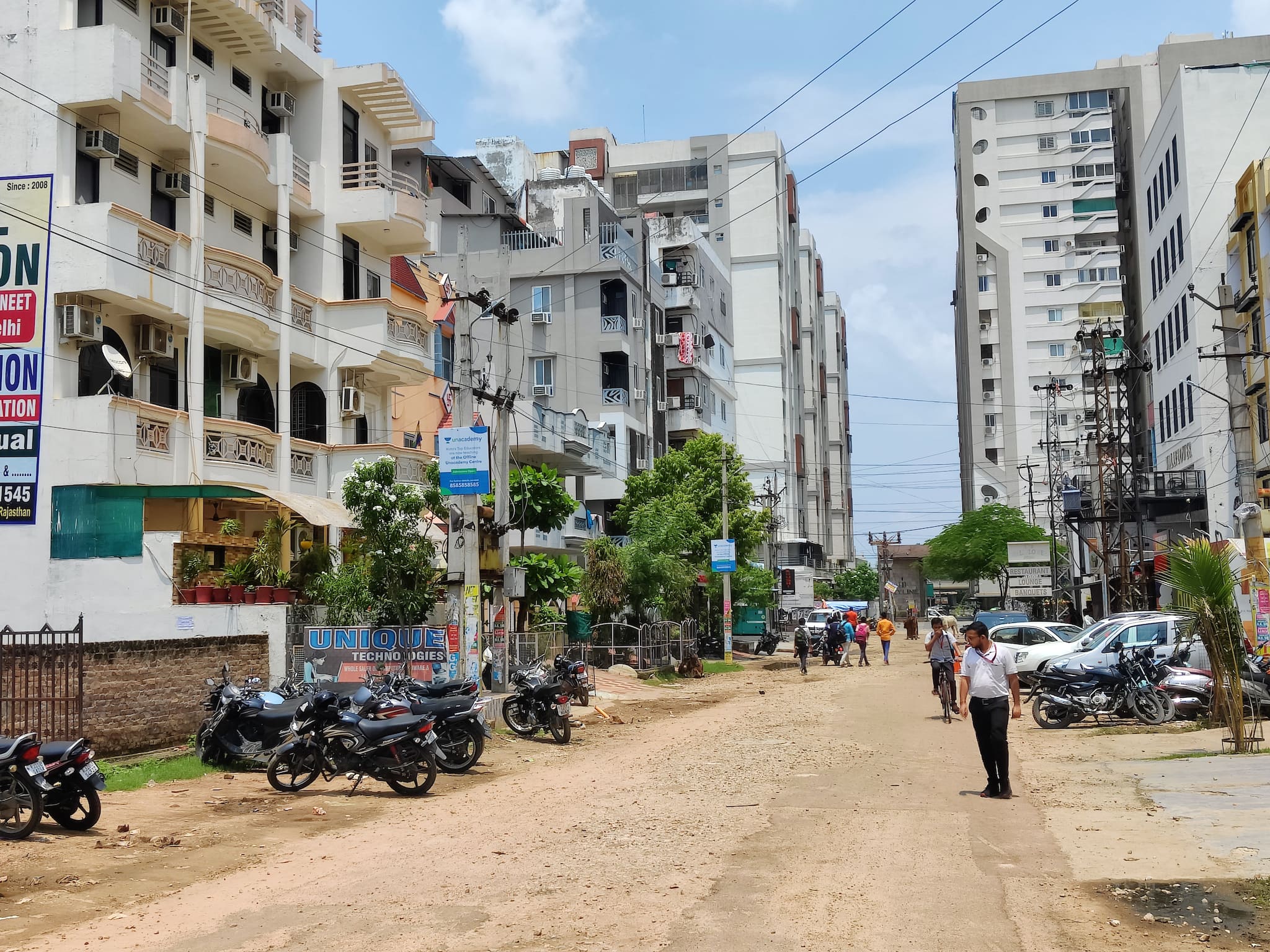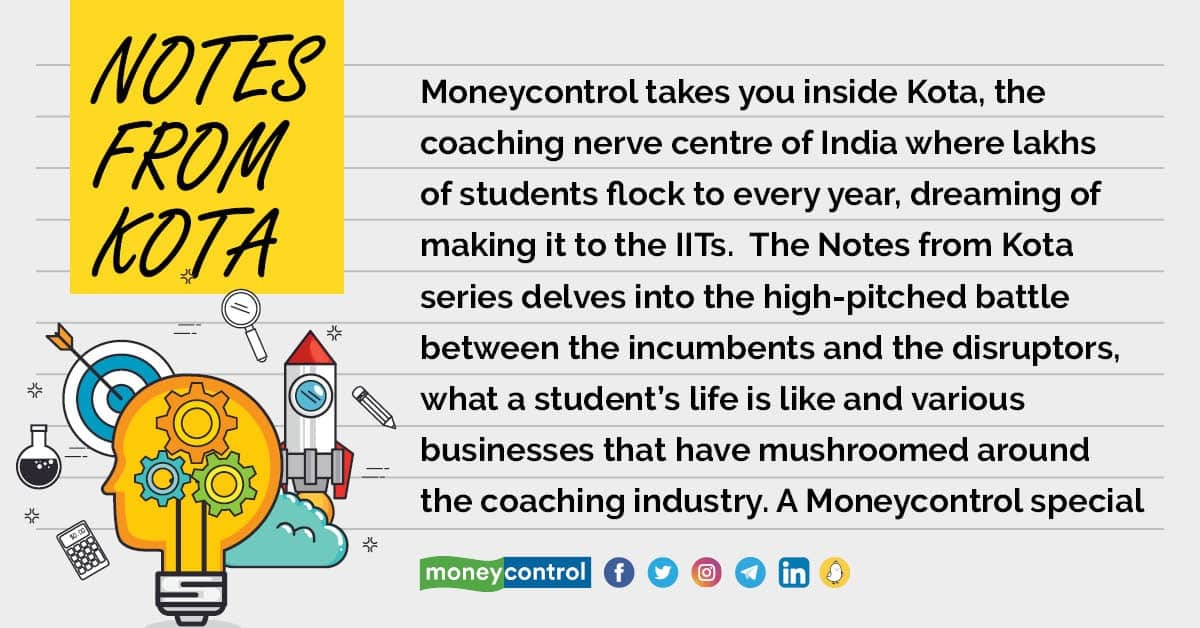



Movies and cricket may be India’s national pastimes but not in Kota, a town located on the banks of the Chambal River, in Rajasthan.
In every lane in the city, instead of billboards of movie or sports stars, there are giant photos of former All India Rank (AIR) holders spouting motivational quotes, alongside blown up pictures of famous teachers.
The streets are full of kids wearing t-shirts of various coaching classes. In almost every lane you will find hostels, messes, libraries and small food stalls that also sell stationery items.
 Outside one of Allen's main centers at 1:30 pm in Kota when the morning batch ends.
Outside one of Allen's main centers at 1:30 pm in Kota when the morning batch ends.
“Path to success”, “educating for a better tomorrow” and “nurturing potential through education” are just some of the mission statements that catch your eye once you set foot in Kota. These are the taglines of famous coaching centres such as Allen Career Institute, Resonance Eduventures and Motion Classes, which have scaled over the years in Kota.
Together, these institutes have transformed Kota into the nerve centre for students preparing to take entrance exams to gain admission into India's premier engineering and medical institutes.
In recent months, a high-pitched battle has broken out between these coaching academies and a scrum of heavily funded edtech companies, such as Unacademy and PhysicsWallah, which have also opened centres in Kota, hoping to tap into its captive student population.
A byproduct of liberalisation
Kota was well-known as an industrial hub until the early 1990s. The town had industries catering to sectors such as textiles, chemicals, steel and power, among others. These industries provided direct or indirect livelihood to almost everyone in the town.
But locals say the liberalisation of 1991 took a toll as the local industry suffered and many people lost their jobs. Around that time, coaching institutes such as Bansal Classes and Allen Career Institute started becoming attractive business prospects.
Bansal Classes was the first coaching institute to be formally set up in Kota. It was founded by Vinod Kumar Bansal. A mechanical engineer from IIT BHU, Bansal worked at JK Synthetics until 1983. He quit his job after being diagnosed with a rare muscle ailment and was advised to not work full-time in an engineering role.
Bansal always had the passion to teach and started conducting classes in his home in 1983. He used to teach mathematics. The turning point for Bansal Classes came in 1985, when a student cracked the IIT exam. Word spread, and soon more students, even those from neighbouring districts, started taking tuitions at Bansal Classes.
Subsequently, in the late 1980s and early 1990s, a few more students cleared the IIT entrance examinations, which motivated many educators to expand their coaching classes. Educators who taught at these coaching institutes also started their own tuition centres.
These tuition centres had special arrangements for IIT aspirants, as they tied up with local secondary schools for class 12 board exams. The students were told to concentrate more on the IIT entrance exam and not to worry about attending class 12 lectures. This model was then adopted by many coaching institutes across the country.
In the following years, the coaching centres went on to do business worth crores of rupees and students from across the country started flocking to Kota. Indeed, in 2019, the streets were bustling with as many as 150,000 young medical and engineering aspirants.
But the Kota engine ground to a halt in March 2020, when the government announced a nationwide lockdown to curb the spread of Covid-19.
New lease of life
Today, the intense rivalry between the incumbents and the edtechs has given Kota a new lease of life, as more students return to physical coaching centres.
According to multiple hostel owners and educators in the town, Kota has seen as many as 300,000 students coming in this year, a two-fold jump over 2019, a pre-pandemic year.
 A lane full of hostels on either side in Rajeev Gandhi Nagar, Kota
A lane full of hostels on either side in Rajeev Gandhi Nagar, Kota
“This year is a record-breaking year for Kota,” said Mohit Bhargava, one of Kota’s most sought after Physics teachers, who recently joined Unacademy from arch rival Allen Institute.
“I don’t think I have seen anything like this in the last 15 years,” Bhargava, who has been teaching in Kota since 2006, added.
The last two years have been very difficult for Kota, especially for small businesses, be they tea vendors or hostel owners or laundrymen, said Bhargava.
“There was nothing happening. You know how the streets are when students are everywhere. They buy things from us, they stand at our stalls and talk among themselves, gossip, sing songs and what not. It’s just very lively,” said Jatin Lal, who runs a hostel in Kota.
“We knew kids would come back here, as Kota is Kota — nothing can replace it. And looking at how many students are coming this year, we are more than relieved and know for a fact that students will never stop coming to the town,” Lal added.
A billion dollar opportunity?
In Kota, on an average, a student pays up to Rs 1.5 lakh a year. If educators’ estimates are to be believed, over 300,000 students have been admitted to Kota’s coaching centres this year. And this translates into a market worth as much as Rs 5,000 crore for the coaching giants in the town, according to Nitin Vijay, founder and CEO of Motion Classes, one of the town's most famous education centres.
Vijay said that educators believe that the influx of students will only go up in the coming years, and create a ‘billion dollar opportunity’ for the town.
“The entry of new-age edtech companies like Unacademy and PhysicsWallah is a manifestation of that,” Vijay added.
The entry of these new-age edtech companies also compelled incumbents like Allen and Motion to offer digital and online education solutions. Before the pandemic, very few companies in Kota were offering digital and online content.
“Hybrid is a shift that has happened in Kota’s institutes and it is very evident since the pandemic,” said Anu Gupta, an educator at Allen Career Institute.
“Traditional classes in Kota are fast adapting to technology and it is a welcome move because we are all visual learners. We learn better if we see something and hybrid helps kids visualise things. In my opinion, hybrid learning is going to evolve in Kota over the coming years,” Gupta added.
'Nothing can replace Kota’
Over the years, as Kota became one of India’s largest education hubs, the town’s ecosystem has matured, making it conducive for students to study hard, said Vijay.
“Everyone in the town talks about studies. From the small tea vendor, to your hostel owner or warden, everyone keeps a tab on how your studies are going,” he added. “That’s the beauty of it. And moreover, Kota is safe as a city so no parent is concerned about the safety of their kids.”
Vijay’s comments were corroborated by students, who said that at times, their marks are better known to the hostel wardens rather than their parents.
“We talk to our parents frequently, but Kalpesh bhaiya (hostel owner) knows exactly when our tests are and what we are up to,” said Abhilash Jain, a JEE batch student.
“He (Kalpesh) talks to every student in the hostel and he knows what exactly is happening with them. He guides us, at times asking us to go watch a movie on Sunday to refresh our minds. He even organises small events, games etc at the hostel, which helps us refresh our minds. I think this is something that sets Kota apart — the atmosphere is pretty much study-oriented,” Jain added.
Days in Kota
Days in Kota start early as students have classes starting from 6:30 am. Even the smallest tea stall opens at 5:45 am. Many shops stay shut in the afternoons till about 5PM as most students are either at classes or in libraries. These shops reopen at around 5:30 pm and remain open till 9:30 or 10 pm.
Weekends in Kota are quiet. One would imagine the streets of a town where the majority of the population is in their teens to be buzzing on weekends. But for these teenage students, Saturdays are no different as they follow a six-day schedule and get some time off only on Sundays.
“We have regular classes on Saturdays, so that’s like a proper working day for us. On Sundays, we have a test in the morning for about three hours, and we get the rest of the day for ourselves,” said Ipshita Negi, a NEET aspirant.
“After studying hard throughout the week, on Sundays, everyone usually just sleeps or in the evenings we go out to City Mall (a nearby mall) or some park. We have to be back early though as next day we need to start our schedule again,” Negi added.
The academic pressure in Kota is almost palpable and gets to you at some point. Every student who comes here has a singular mission: to crack competitive exams, making it into the IITs.
The other side
While many students in the town feel motivated because of the ‘atmosphere’ at Kota, there are a few students who feel the pressure, and that takes a toll on their mental health, and eventually, on their studies.
“Imagine staying in a city where everyone is just asking you about studies, marks, ranks and all,” said a 17-year-old student.
“I failed a class test in April, and I literally felt like running away from all this and taking a break. When I got my result, I stepped out of the class and went to a juice centre downstairs just to feel better, but the juice vendor asked me about my results and I felt so horrible! I have decided to just focus on studies and work very hard these two years and hopefully I will get good results for the rest of my life,” the student added.
The student’s sentiment was echoed by many in the town Moneycontrol spoke with. Some students also refused to talk about this as they feared that their parents would not appreciate them talking openly about their predicament.
The pressure results in unfortunate outcomes. According to various media reports, suicides in Kota have been a nagging issue for all the stakeholders of the town. In May, a media report said that as many as four deaths were reported in Kota in April alone. Between 2013 and 2017, nearly 60 students died by suicide in Kota.
“Most of the pressure is created by the parents,” said an educator, requesting anonymity.
“Parents directly compare their child’s rank or marks with the money they have invested in his tuition classes and they talk about this openly with the kid …. 16 odd years old. And that’s how the kid starts feeling the pressure,” the educator added.
Moreover, children as young as 12 years of age have started coming to the town. Their class 10 exams are taken care of by these coaching institutes. An educator explained that parents feel their children will excel if they start early. The educator added that since there was demand for such preparation, the institutes jumped at the opportunity.
As Kota’s streets are back bustling with young engineering and medical aspirants, education companies are aggressively competing for a larger share of the multi-million dollar education hub. Kota has now become a battleground for education companies, and as the so-called disruptors like Unacademy and the so-called incumbents like Allen slug it out, the town is the ultimate winner.


Discover the latest Business News, Sensex, and Nifty updates. Obtain Personal Finance insights, tax queries, and expert opinions on Moneycontrol or download the Moneycontrol App to stay updated!
Find the best of Al News in one place, specially curated for you every weekend.
Stay on top of the latest tech trends and biggest startup news.